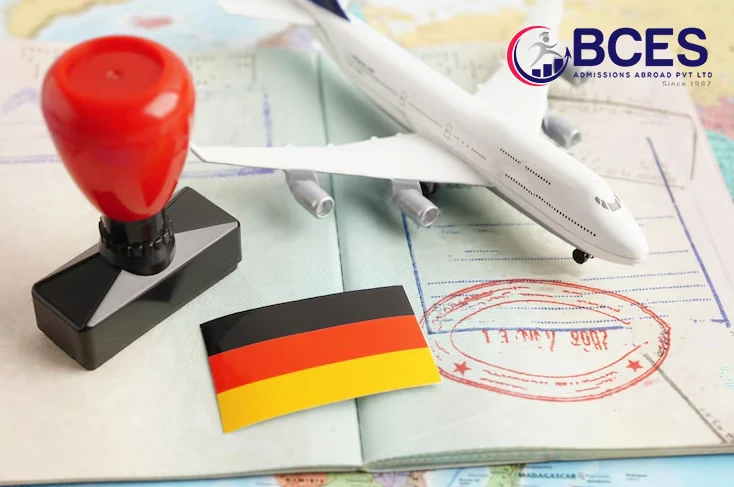Your Step-by-Step Guide to Getting Your German Student Visa

30 June 2025
Germany has become the go-to destination for Indian students for foreign higher studies. With its history of excellence in scholarship, cutting-edge research, low tuition, and cosmopolitan society, Germany is a fantastic launching ground for talented brains.
But even before you step foot in this dynamic nation, there’s an important process you need to undertake—getting your student visa approval.
Here at BCES Admissions Abroad, we have experienced many students like you and helped you go through each stage of the application. We know that the visa processes will confuse you, particularly if this is your first time going through foreign laws and documents. This is why we have made it easy by providing an easy-to-understand guide tailored to Indian students.
So I guess if you are finally ready to make your admission a real trip overseas, the following is what you must do.
Step-by-Step German Student Visa Application Guide
Step 1: Secure Your University Admission Letter
Before you begin your visa application, the most important and first thing is to get an admission letter from a recognized German university. Regardless of whether you’re enrolling for a bachelor’s, master’s, or prep course, your course must be eligible for international students for sponsorship of the visa.
Step 2: Know Your Visa Type
The majority of Indian students studying German for a long period of time must obtain a National Visa (Type D). If you’re studying a language course or foundation course, your needs will be slightly different. Check out the website of the German embassy to ensure you select the right type of visa from your course.
Step 3: Set up a Blocked Account
To prove that you are able to financially sustain yourself in Germany, you will need to open a Blocked Account. This account blocks an agreed amount of money which will be made available to you each month when you are in Germany. The current minimum deposit is €11,208, which will be enough for your living costs for a year.
Step 4: Collect Your Required Documents
Ensure you collect the following documents meticulously. Below is a checklist to ensure you are well-organized:
- Valid passport
- Official university acceptance letter
- Confirmation of blocked account
- Educational certificates (10th, 12th, bachelor, etc.)
- English or German language proficiency proof (IELTS, TOEFL, or Goethe Institute certificates)
- Current health insurance for a minimum of the first 3 months of your stay
- Filled visa application form and declaration
- Recent passport photos as per biometric regulations
- A properly written Statement of Purpose (SOP)
- German accommodation proof
- Proof of payment of visa application fee
*Tip: Ensure that all your documents are either English or German and bring along originals as well as copies to your appointment.
Step 5: Book Your Visa Appointment
Go to the German Embassy or VFS Global website to schedule your visa appointment. Appointments might be limited during rush hours, so attempt to schedule early to avoid inconvenience.
Step 6: Attend Your Visa Interview
This is your time to express your academic goals and future ambition. Groom yourself, smile, and bring your documents neatly arranged. You will be questioned regarding your university, selected program, future career, and support of your studies.
Step 7: Wait for the Decision
Your application will be processed after the interview. Normal processing times are between 4 to 12 weeks, depending on the intake period and workload at the embassy. Be patient and check your email regularly for information.
Step 8: Prepare to Fly
Once your visa has been approved, you will be granted an entry visa that you can use to travel to Germany. When you arrive in Germany, you will have to register with the Foreigners’ Office (Ausländerbehörde) so that your entry visa can be converted into a long-term residence permit.
At BCES Admissions Abroad, we don’t just help you submit documents—we support your entire study abroad dream. From course selection to preparing you for the visa interview, we offer tailored guidance at every stage. Contact BCES Admissions Abroad at +91-9319996328 or email your query at enq@bces.in.
Frequently Asked Questions (FAQs)
You must deposit at least €11,208, which is considered sufficient for one year of living expenses in Germany.
Not really. If your course is conducted in English, you will need English proficiency (IELTS/TOEFL). For German-language courses, proof of B1 or B2 level German is usually expected.
Submit at least 3 months before your course starts to allow ample time for processing.
Yes. You are allowed to work 120 full days or 240 half days annually in addition to study.
If your visa is rejected, the embassy will tell you the reason why. You can reapply or appeal after you have fixed the stated reasons.